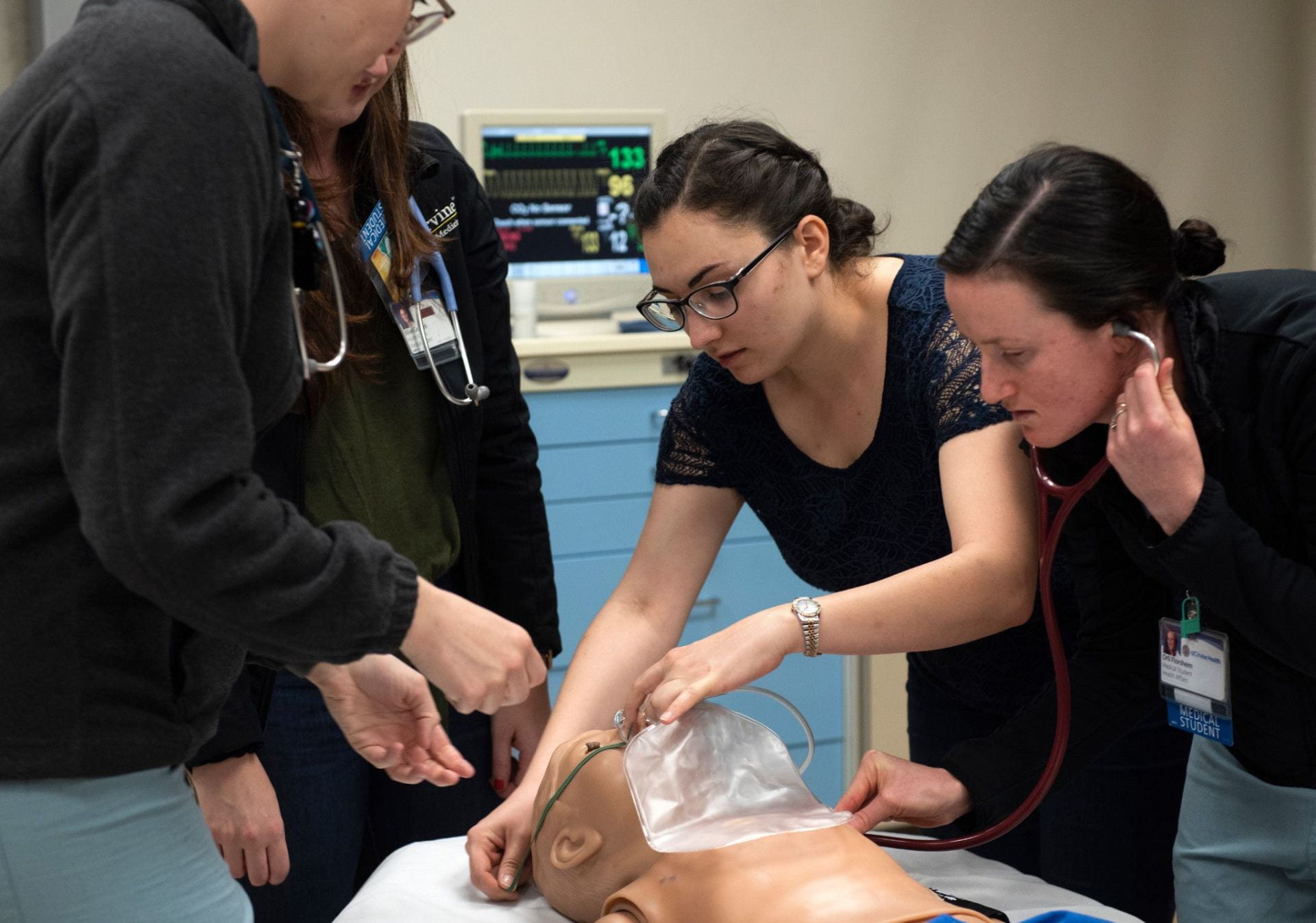Literary journalism at UCI: The backstory
The who, what, where, when and why of the only such major in the nation

Fifteen years ago, UCI’s brand-new literary journalism program had just one faculty member. Barry Siegel, a Pulitzer Prize winner and Los Angeles Times writer of 28 years, led the first students – far more than had been expected – through a series of classes and workshops focused on narrative nonfiction, which combines factual reporting with some of the stylistic elements of fiction.

Steve Zylius / UCI
The program, housed in the Department of English, now has a core faculty of five. Besides director Siegel, there’s award-winning journalist Erika Hayasaki, formerly of the Los Angeles Times; best-selling author Miles Corwin, once a crime reporter at the Los Angeles Times; acclaimed writer Amy Wilentz, former Jerusalem correspondent for The New Yorker; and another Pulitzer recipient and ex-Los Angeles Times reporter, Hector Tobar.
Alumni include Michaela Holland ’16, a virtual reality filmmaker and immersive storyteller who won a 2018 Sports Emmy Award in outstanding digital innovation for her VR video “Capturing Everest”; writer-producer Traci Lee ’11, who oversees NBC Asian America; and Sona Patel ’06, senior social strategist at The New York Times.
Literary journalism at UCI has clearly come a long way. But as the only major of its kind in the country and the only undergraduate journalism program in the University of California system, it continues to be a pioneer in teaching up-and-coming generations of journalists. Here, administrators, instructors and students discuss the program’s inception, evolution and direction.
Barry Siegel, director of literary journalism: I came to UCI in the fall of 2003. The English department had been considering many different ideas for possible new majors, and Linda Georgianna, now a professor emerita, was head of the committee. She’d been a college roommate of literary journalist Madeleine Blais, who went on to become an accomplished narrative nonfiction writer. So through her, she was plugged into this idea.
They were looking for a director, and somebody suggested that they contact me. I was still working at the Los Angeles Times. I had been there for a long time, mostly with a literary journalism beat, so I was in a pretty good position. Also, I absolutely loved the idea of a literary journalism program. If this was just a conventional journalism school, I don’t think I would’ve been nearly as interested. It was really extraordinary. What they were essentially saying was that nonfiction narrative is worthy of a degree program. It was recognizing literary journalism as a field of literature.
Patricia Pierson, associate director and lecturer: I first connected with the program before I graduated, probably in 2004; I was selected as a graduate student researcher for the program. Then I graduated in the summer of 2005 with my Ph.D. in comparative literature. They had opened up a job for an academic coordinator with the program, so I applied for that and was selected.
I think in the early days we never had the right balance of faculty to students, and that was something we really fought for over the years: ensuring that when students came into one of our core writing workshops – which we feel are really the jewels of our program – they would have a small enough class size to work around a table, as a small group. I think that’s what’s unique. I try to explain what the program is like to prospective students, and I always describe it as a small liberal arts college experience with all the benefits of being situated in a huge research institution.
Siegel: The nature of the business model for journalism has kind of imploded since the first year. Obviously, the internet has just changed everything. Newspapers were full of advertisements that now appear online. A huge change is simply the shift to the digital world. The opportunities for students are different – there are still great opportunities, but they’re different. I faced a situation where you had to climb a fixed ladder with gatekeepers, whereas now, if you write something great, you can just put it out there and it gets noticed. So there are exciting new opportunities. One of the things we’ve done is mix more digital and multimedia. We have to adjust to the changing world and help prepare our students.
Pierson: A lot of students in our major are first-generation college students. Many of them are going to school full time and working 30 hours a week, or they have faced resistance from family members when they’ve wanted to choose what some people see as the impractical major of literary journalism, and they fight really hard to be in the program that they want to be in. You can see that in the quality of their work – that they really care.
Siegel: I’m optimistic. There are great people here. For various reasons, I’d like to start a graduate program, a master’s program, in literary journalism. I think that storytelling is never going to go out of fashion. That’s the heart of the program. For instance, we’re talking about trying to expand. There are other people across disciplines on campus who have stories to tell but aren’t storytellers: scientists, medical people, some in social ecology. And they come to us. One of our ideas is to try to be a guide, to help not just literary journalism majors but other people who have stories to tell.
Amy DePaul, reporting mentor and lecturer: When I was teaching at Miami University of Ohio, I read Barry’s Pulitzer-winning piece [“A Father’s Pain, a Judge’s Duty, and a Justice Beyond Their Reach”] and liked it so much that I immediately assigned it to students. So that was my earliest introduction to the literary journalism program. For me, the most fulfilling aspect about it has been seeing students develop their reporting and writing skills and, in some cases, go on to produce great work in and out of the classroom. I love it when they can show me something new and I can learn from them. Occasionally, I’ve collaborated professionally with students and former students, which I’ve really enjoyed. What sets it apart from other programs is that students in the major get to know one another and one another’s writing. They foster community. The professors in the program are very hands-on, which is great.
Pierson: Amy DePaul and Barry Siegel are the two faculty members who teach every single student who graduates from UCI with a literary journalism degree. DePaul teaches all of our reporting, so she sees everyone in LJ 21 and LJ 100, which are both required for the degree, and Barry always teaches 101A, which is another one of our required courses. They have a unique position in the program because they really know everybody.
Amy DePaul is always one of the first people who will come to us and say, “Hey, we have this need in our curriculum that’s not being met. I’ve noticed from working with the students that they need more of this or more of that.” She’s been a real driving force in helping us to refine our course offerings and in how we have structured the program.
Caitlin Antonios, senior in literary journalism and editor in chief of New University: The program is one of the few majors that teach practical skills in each course. None of the requirements felt like they were a box to check. Everything I was learning I was also applying to my reporting.
Unlike writing class essays (which are wonderful in their own way), we’re writing articles that mean something and make a difference. They can impact people’s lives. We’re doing real journalism! On the same note, the hardest part is meeting the standard that is set. The nature of the program – and the talent of other literary journalism majors – means that everyone has to step up their game and produce the best work they can. It’s difficult and stressful at times but certainly worth it.
I would like to become a professional journalist and write long-form feature pieces for a print publication. I feel very lucky to have had the experiences I did at UCI through the literary journalism program and working at the student paper, because I’m confident that I’m well-equipped to pursue those dreams.
Michaela Holland, alumna: As an undergrad, I wasn’t planning on getting into virtual reality, but I thought, “How can I immerse people in my stories? How can I make people interact with my stories the way they do at Disneyland, Legoland or SeaWorld? How can I make stories that are amazing move beyond the paper, the radio or the movie?” All that content is so saturated, and people would constantly tell me, “The journalism field is dead; there’s no money.” Well, why would someone pay for escapism at Disneyland and not pay for a New York Times article? Why can’t I find that bridge?
UCI’s literary journalism program is steeped in old traditions of storytelling and true building of narrative, which is really hard to teach in our day-to-day world that is so saturated in the digital landscape and the need for moments that instantaneously pay off. But the quality of that traditional foundation is priceless – it really is. Something we’re losing is this idea of storytelling, and what I think the literary journalism program does so well is help you grow in that sense – and not in the sense of “I’m a storyteller; listen to me” but more in the sense of giving you the tools and practice to become a story sharer. Here’s an amazing story. Come share it with me. Come take a journey with me. Let’s go back in time and relive Seabiscuit. Let’s go back in time and relive Pearl Harbor. That’s really the skill set that the program gives you as a storyteller. If people have the wherewithal to master the journalism and the narrative foundation and then move, grow and expand that, they can give something really valuable to the world.


